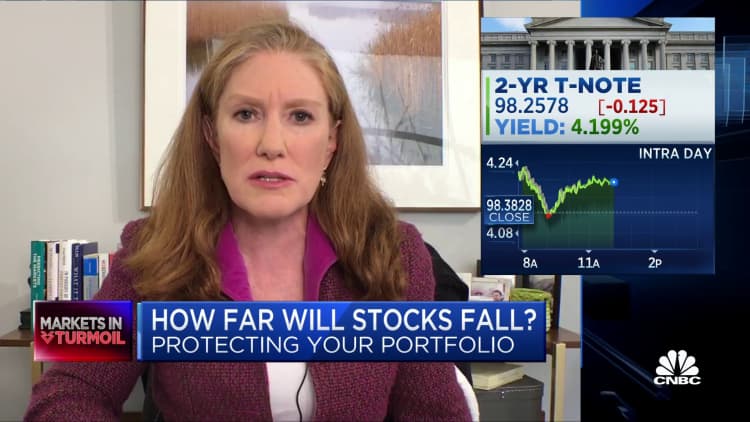Hits: 10
It’s very easy to get swayed by headline news and market drops when you’re not clear on what you’re working towards.
Amanda Wallace
Head of insurance operations at MassMutual
Meanwhile, a majority of Americans — 80% — are already worried about how a recession could impact their daily finances, MassMutual’s poll found. The survey was taken in August and included 1,000 adults.
Even so, many respondents indicated they are still optimistic about their finances long-term, according to Amanda Wallace, head of insurance operations at MassMutual.
There are steps you can take now to ward off any negative impact a downturn could have on your finances.
It all comes down to creating a solid plan and writing it down, according to Wallace.

“It’s very easy to get swayed by headline news and market drops when you’re not clear on what you’re working towards,” Wallace said.
1. Eliminate unnecessary expenses
Start by evaluating your non-essential discretionary spending and deciding where you can cut back.
That may include cutting subscriptions to streaming TV services or print magazines. Perhaps you can cut back on ordering food delivery or activities your children no longer enjoy.
Really take a look at what is excess and where you can save in order to find more money to sock away in an emergency fund, Wallace said.
2. Establish an emergency fund
If the economy does dip into a recession, it’s uncertain what that could bring. In a worst-case scenario, that could include a job loss or unexpected medical expense at the worst possible time.
Having cash set aside in case of an emergency can help you weather those uncertainties, Wallace said.
“As a general rule of thumb, you should have at least three to six months living expenses that you can easily access,” Wallace said.
Thana Prasongsin | Moment | Getty Images
These funds should be kept out of the market and in an account where you can quickly access the funds, such as in a money market or high yield savings account.
“This can help weather the storm without having to tap into retirement assets or using high interest rate credit cards or loans,” Wallace said.
3. Pay down debt
Once your emergency fund has been established and you have gone through your budget, it’s time to take your extra money and pay down balances like high interest credit cards, Wallace said.
Paying down credit cards generally comes after establishing an emergency fund, due to the relief extra cash can bring in a downturn, Wallace said. However, it is important to remember that everyone’s situation is different and may call for different priorities.
The Federal Reserve’s continued interest rate hikes will push the cost of unpaid balances even higher. As such, it may be time to seek a 0% interest rate transfer card if you have good credit, or possibly a low interest personal loan if you don’t, Matt Schulz, chief credit analyst at LendingTree, previously told CNBC.com. Even asking your current credit card company for a lower interest rate may work.
“Any of those moves can reduce your rates significantly more than the amount that the Fed is raising them by on a monthly basis, so it can be a really significant thing,” Schulz said.
4. Revisit your investment allocations
Even as economic fears may send the markets into a frenzy, it’s important to stay the course when it comes to your investment plans, Wallace said.
“You should not stop investing in your 401(k) or any other type of investment plan that helps you prepare for retirement,” Wallace said.
Also take a look at your portfolio investments and 401(k) contributions to make sure you’re not taking on more risk than you realize, she said. With that, it’s a good idea to sit down with your partner to make sure your investment strategies for retirement are aligned if you’re investing in separate plans.
“You should consult a financial professional if you want to weigh different scenarios and market options and get some really tailored advice for you, your family and your situation,” Wallace said.
Be the first to comment